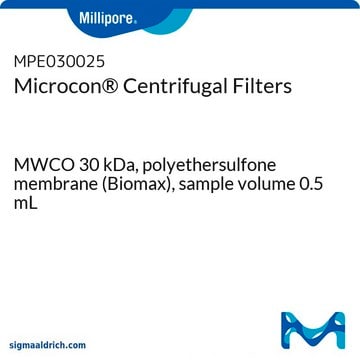MRCF0R030
Microcon® Centrifugal Filters
NMWCO 30 kDa, Ultracel® regenerated cellulose membrane (low binding), sample volume 0.5 mL
Synonym(s):
Centrifuge concentrator
About This Item
Recommended Products
material
Ultracel® regenerated cellulose membrane (low binding)
polyacetal base (membrane support)
polycarbonate device top
polypropylene tube (for filtrate/concentrate)
silicone O-ring (medical-grade)
Quality Level
sterility
non-sterile
feature
holdup volume> 10 μL
manufacturer/tradename
Microcon®
parameter
0.5 mL sample volume
technique(s)
DNA purification: suitable
RNA purification: suitable
protein extraction: suitable
protein purification: suitable
L
4.50 cm (1.8 in.)
diam.
12.3 mm
filtration area
0.32 cm2
pore size
30 kDa NMWCO
shipped in
ambient
Related Categories
General description
•Typical recoveries of greater than 95%, even for dilute solutions
•Reverse spin to maximize recovery, even in the smallest samples
•Convenient storage of filtrate or concentrated sample in standard microfuge tube
•Concentration factors up to 100X
Features:
•High recovery for small volumes with reverse spin (concentration factor less than 20X)
•Low-binding Ultracel membrane
•Fast processing
Sample applications:
•Recovery of genomic DNA for forensic applications
•Concentration and desalting of nucleic acids (high recovery alternative to ethanol precipitation)
•Removal of primers from amplified DNA
•Easy filtrate recovery, exploiting the flat membrane design
Linkage
Legal Information
Storage Class Code
10-13 - German Storage Class 10 to 13
Certificates of Analysis (COA)
Search for Certificates of Analysis (COA) by entering the products Lot/Batch Number. Lot and Batch Numbers can be found on a product’s label following the words ‘Lot’ or ‘Batch’.
Already Own This Product?
Find documentation for the products that you have recently purchased in the Document Library.
Articles
An optimized peptide mapping protocol using NISTmAb as a model monoclonal antibody, shorter incubation times, and improved digestion buffer to demonstrate minimal artificial asparagine deamidation and methionine oxidation.
An optimized peptide mapping protocol using NISTmAb as a model monoclonal antibody, shorter incubation times, and improved digestion buffer to demonstrate minimal artificial asparagine deamidation and methionine oxidation.
An optimized peptide mapping protocol using NISTmAb as a model monoclonal antibody, shorter incubation times, and improved digestion buffer to demonstrate minimal artificial asparagine deamidation and methionine oxidation.
An optimized peptide mapping protocol using NISTmAb as a model monoclonal antibody, shorter incubation times, and improved digestion buffer to demonstrate minimal artificial asparagine deamidation and methionine oxidation.
Related Content
Microcon® Centrifugal Filters simply and efficiently concentrate and desalt solutions of DNA, RNA, protein or other macromolecules, using any centrifuge that can accept 1.5 mL tubes.
Our team of scientists has experience in all areas of research including Life Science, Material Science, Chemical Synthesis, Chromatography, Analytical and many others.
Contact Technical Service


